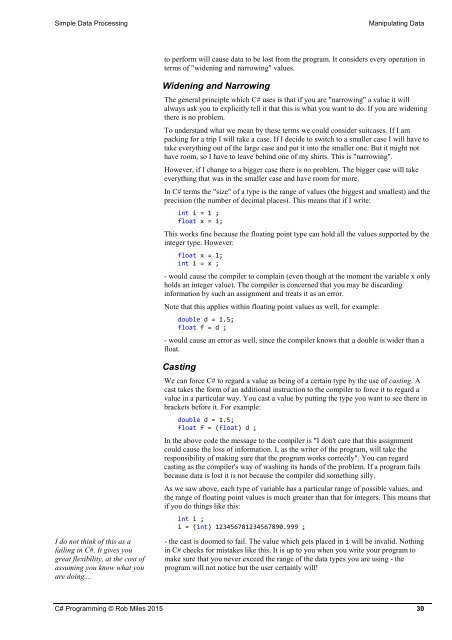C Programming Yellow Book
6019BjHWX
6019BjHWX
Create successful ePaper yourself
Turn your PDF publications into a flip-book with our unique Google optimized e-Paper software.
Simple Data Processing<br />
Manipulating Data<br />
to perform will cause data to be lost from the program. It considers every operation in<br />
terms of "widening and narrowing" values.<br />
Widening and Narrowing<br />
The general principle which C# uses is that if you are "narrowing" a value it will<br />
always ask you to explicitly tell it that this is what you want to do. If you are widening<br />
there is no problem.<br />
To understand what we mean by these terms we could consider suitcases. If I am<br />
packing for a trip I will take a case. If I decide to switch to a smaller case I will have to<br />
take everything out of the large case and put it into the smaller one. But it might not<br />
have room, so I have to leave behind one of my shirts. This is "narrowing".<br />
However, if I change to a bigger case there is no problem. The bigger case will take<br />
everything that was in the smaller case and have room for more.<br />
In C# terms the "size" of a type is the range of values (the biggest and smallest) and the<br />
precision (the number of decimal places). This means that if I write:<br />
int i = 1 ;<br />
float x = i;<br />
This works fine because the floating point type can hold all the values supported by the<br />
integer type. However:<br />
float x = 1;<br />
int i = x ;<br />
- would cause the compiler to complain (even though at the moment the variable x only<br />
holds an integer value). The compiler is concerned that you may be discarding<br />
information by such an assignment and treats it as an error.<br />
Note that this applies within floating point values as well, for example:<br />
double d = 1.5;<br />
float f = d ;<br />
- would cause an error as well, since the compiler knows that a double is wider than a<br />
float.<br />
Casting<br />
We can force C# to regard a value as being of a certain type by the use of casting. A<br />
cast takes the form of an additional instruction to the compiler to force it to regard a<br />
value in a particular way. You cast a value by putting the type you want to see there in<br />
brackets before it. For example:<br />
double d = 1.5;<br />
float f = (float) d ;<br />
In the above code the message to the compiler is "I don't care that this assignment<br />
could cause the loss of information. I, as the writer of the program, will take the<br />
responsibility of making sure that the program works correctly". You can regard<br />
casting as the compiler's way of washing its hands of the problem. If a program fails<br />
because data is lost it is not because the compiler did something silly.<br />
As we saw above, each type of variable has a particular range of possible values, and<br />
the range of floating point values is much greater than that for integers. This means that<br />
if you do things like this:<br />
int i ;<br />
i = (int) 123456781234567890.999 ;<br />
I do not think of this as a<br />
failing in C#. It gives you<br />
great flexibility, at the cost of<br />
assuming you know what you<br />
are doing....<br />
- the cast is doomed to fail. The value which gets placed in i will be invalid. Nothing<br />
in C# checks for mistakes like this. It is up to you when you write your program to<br />
make sure that you never exceed the range of the data types you are using - the<br />
program will not notice but the user certainly will!<br />
C# <strong>Programming</strong> © Rob Miles 2015 30


